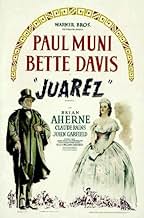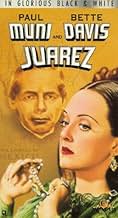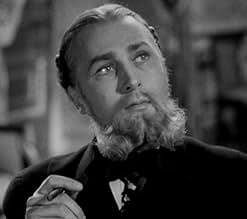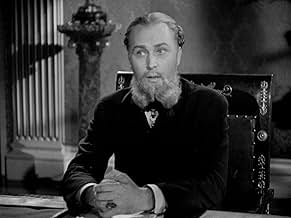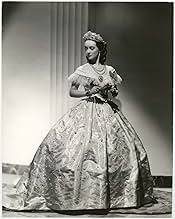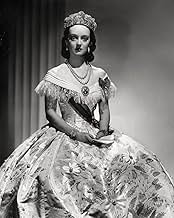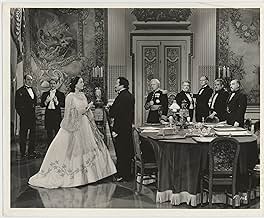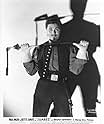Juarez
- 1939
- Tous publics
- 2h 5m
IMDb RATING
6.9/10
2.7K
YOUR RATING
Louis Napoleon III (Claude Rains) takes advantage of the American Civil War to circumvent the Monroe Doctrine and expand his power by helping Emperor Maximilian von Habsburg (Brian Aherne) t... Read allLouis Napoleon III (Claude Rains) takes advantage of the American Civil War to circumvent the Monroe Doctrine and expand his power by helping Emperor Maximilian von Habsburg (Brian Aherne) to add Mexico to his empire.Louis Napoleon III (Claude Rains) takes advantage of the American Civil War to circumvent the Monroe Doctrine and expand his power by helping Emperor Maximilian von Habsburg (Brian Aherne) to add Mexico to his empire.
- Nominated for 1 Oscar
- 3 wins & 1 nomination total
Featured reviews
Although there are some mistakes historically speaking,this is an absorbing screenplay,with superlative performances by Paul Muni,Bette Davis and Brian Aherne,who should have been at the top of the bill too,for he has more scenes than his two co-stars.
Muni is almost frightening with his impassive face and his slow delivery.If looks could kill,his certainly would...
Davis ,although she does not look like Charlotte physically ,gives a captivating portrayal of the empress.The scene when she prays Virgin Mary is impressive ,but not true: she was not sterile,but she and the emperor used to sleep apart!Their relationship was much more complex than the one depicted by Dieterlé: actually,the emperor was often away,it seemed that their strange love worked from a distance.Little by little,Maximilian lost all interest in power and Charlotte was ruling while he was gone (which often happened)or was staying in his Cuernavaca "paradise" .
Aherne is Maximilian in the flesh.It's interesting to notice that his brother Francis-Joseph had deprived him of all his rights and his titles in Austria.Historians generally agree that he would not have accepted the Mexican throne,if Charlotte had not been his wife. the problem is that the film doesn't show us the couple BEFORE they get to Mexico:one thing to bear in mind is that Max did not accept the throne overnight;and many people in Europa (notably Queen Victoria and Empress Elizabeth aka "Sissi" ) had warned them it was more a curse than a blessing.Charlotte (Carlotta) ,someone reportedly said ,wanted to reign over any people anywhere.Sissi called her Max's black angel. Maximilian is depicted as a chivalrous noble sovereign which he was in a way.But of course ,he had lots of (Mexican)lovers since he didn't sleep with his wife
Dieterlé does not pass over in silence the obnoxious role played by Napoleon the Third (and wife Eugénie de Montijo).Charlotte does show her contempt:"He is an impostor,his family is not an old one like ours ".The famous scene of the orangeade is included .Today,no serious historian would put forward that the drink was poisoned.But it might be possible that she was poisoned before leaving Mexico.Davis shines when she plays these scenes of madness.The scenes in Paris are not thoroughly accurate though:Eugenie (an incredibly beautiful Sondergaard) met first Carlotta alone in the Grand Hotel -they did not invite her to the Tuileries,which meant a lot about what they felt-Metternich was not the person who helped Carlotta :she first took refuge in the Vatican where the pope had trouble to get rid of her,then her sister-in-law Marie -Henriette ,queen of Belgium,came to her rescue when she was treated almost like a prisoner in Miramar.
All that concerns Maximilian's death is accurate ,his last words were "poor Charlotte!"
Poor Charlotte indeed.She was to outlive almost everyone,even Empress Eugenie! She died in 1927,after years and years of insanity with occasional moments of lucidity ,notably during WW1.
Dieterlé's movie is by no means uninteresting,but it would be exciting to film a remake in the light of the recent works about the Mexican adventure.
Muni is almost frightening with his impassive face and his slow delivery.If looks could kill,his certainly would...
Davis ,although she does not look like Charlotte physically ,gives a captivating portrayal of the empress.The scene when she prays Virgin Mary is impressive ,but not true: she was not sterile,but she and the emperor used to sleep apart!Their relationship was much more complex than the one depicted by Dieterlé: actually,the emperor was often away,it seemed that their strange love worked from a distance.Little by little,Maximilian lost all interest in power and Charlotte was ruling while he was gone (which often happened)or was staying in his Cuernavaca "paradise" .
Aherne is Maximilian in the flesh.It's interesting to notice that his brother Francis-Joseph had deprived him of all his rights and his titles in Austria.Historians generally agree that he would not have accepted the Mexican throne,if Charlotte had not been his wife. the problem is that the film doesn't show us the couple BEFORE they get to Mexico:one thing to bear in mind is that Max did not accept the throne overnight;and many people in Europa (notably Queen Victoria and Empress Elizabeth aka "Sissi" ) had warned them it was more a curse than a blessing.Charlotte (Carlotta) ,someone reportedly said ,wanted to reign over any people anywhere.Sissi called her Max's black angel. Maximilian is depicted as a chivalrous noble sovereign which he was in a way.But of course ,he had lots of (Mexican)lovers since he didn't sleep with his wife
Dieterlé does not pass over in silence the obnoxious role played by Napoleon the Third (and wife Eugénie de Montijo).Charlotte does show her contempt:"He is an impostor,his family is not an old one like ours ".The famous scene of the orangeade is included .Today,no serious historian would put forward that the drink was poisoned.But it might be possible that she was poisoned before leaving Mexico.Davis shines when she plays these scenes of madness.The scenes in Paris are not thoroughly accurate though:Eugenie (an incredibly beautiful Sondergaard) met first Carlotta alone in the Grand Hotel -they did not invite her to the Tuileries,which meant a lot about what they felt-Metternich was not the person who helped Carlotta :she first took refuge in the Vatican where the pope had trouble to get rid of her,then her sister-in-law Marie -Henriette ,queen of Belgium,came to her rescue when she was treated almost like a prisoner in Miramar.
All that concerns Maximilian's death is accurate ,his last words were "poor Charlotte!"
Poor Charlotte indeed.She was to outlive almost everyone,even Empress Eugenie! She died in 1927,after years and years of insanity with occasional moments of lucidity ,notably during WW1.
Dieterlé's movie is by no means uninteresting,but it would be exciting to film a remake in the light of the recent works about the Mexican adventure.
This is one of five biopics that William Dieterle made for producer Hal B. Wallis at Warner Bros in as many years and the third to star Paul Muni in the title role. Excellent production values suffice it to say. Tony Gaudio is behind the camera and there is a symphonic score by Korngold arranged and orchestrated by Hugo Freidhofer with an effective use of 'La Paloma'.
Film historian David Thompson has dismissed these biopics as being Germanic and stagey. He is fully entitled to his opinion of course but I think his verdict to be harsh especially when one considers the first class actors, both leading and supporting, who appeared in these films.
The characters that linger longest in the memory from this are those of Brian Aherne as Maximilian and Bette Davis as his wife Carlotta. Aherne has never been better quite frankly while Davis is absolutely stupendous in the role. Their scenes together are beautifully understated and the scene where she confronts the ignominious Louis Napoleon, played with relish by Claude Rains, is magnificent. Her descent into madness is subtly handled.
Interesting also to see as future president Diaz that human dynamo John Garfield whose greatest roles were still to come.
Paul Muni I must confess has never really been my cup of tea but that is only my opinion.
The 'execution' of monarchs understandably has always caused more emotional outrage and controversy than that of dictators.
In this film at any rate Juarez feels remorse but his refusal to grant Maximilian a pardon is certainly a blot on his historical reputation.
Excellent film by a European director who adapted to and thrived under the Hollywood system.
As an historical document it is certainly off-centre in many respects but as a piece of entertainment it certainly hits the mark.
Mexican History has not done too well in American cinema. One film (that I am aware of) about Cortez (THE CAPTAIN FROM CASTILE), one Yul Brynner movie about the Aztecs, several films about Santa Anna and the Alamo (including a new one coming out this week), a few films about Pancho Villa (the two most notable ones being VIVA VILLA with Wallace Beery and a film with Telly Savalas as the bandit patriot), one film directed by Elia Kazan, starring Brando and Quinn (who was half Mexican) about Emilianno Zapata, and John Ford's indictment (via Graham Greene's novel) of the anti-Catholicism of the Mexican Revolution. It's not much, and other films set in Mexico tend to promote the image of corruption and incompetence or bloody mindedness. Witness films like THE OLD GRINGO (an account of the end of Ambrose Bierce in the Mexican Revolution), or THE TREASURE OF SIERRA MADRES.
JUAREZ was a possible exception, in that it was to chronicle the odd events of 1862 - 1867 when (in the shadow of the American Civil War, and the temporary inability of the U.S. Government to exercise the Monroe Doctrine)Emperor Napoleon III decided to set up a puppet Hapsburg Emperor, Archduke Maximillian to rule Mexico. The film is supposed to be centered on Benito Juarez, Mexico's greatest liberal and President (his closest 20th Century counterpart is Lazaro Cardenas, who tried to get real land reform into the country). The film shows how Napoleon's scheme unravelled due to Juarez's refusal to accept the French occupation (an early version of the Vietnam War drained French troop strength for five years), as well as the returning threat of American intervention after Lee's defeat in 1865. But worst of all was the choice of the puppet. Maximillian was one of history's dreamers - he believed in the responsibility of royalty to govern for their people, and he was (for a Hapsburg) a liberal. The result was that the scheme was doomed from the start.
The real heart of the film is the competition between Juarez and Maximillian for the hearts of Mexico - both presenting conflicting views of government (but, ironically enough, good government). Because he was a foreigner, tainted by the French army supporting him, Max lost, and he ended up shot by a firing squad (he refused an opportunity to flee). His beloved wife Carlotta (Bette Davis in the film) went insane - dying in 1927 in Belgium, some sixty years after he died). Played by Brian Ahearn, Maximillian is a sympathetic man who pursues a tragic view of duty to it's sad conclusion. Davis shows the intense love of the doomed wife of this doomed man.
The problem is Muni. His performance is stiff, but good - especially when he explains democracy to his leading "Hotspur" military supporter -a young Porfirio Diaz (John Garfield). Garfield, having gotten to know Ahearn is a good guy, tries to convince Muni to join forces (becoming the first minister to the Constitutionally minded Ahearn). Muni rejects it - why have a monarchy at all. But Muni is overlooking the finer shadings of his rival's personality - he isn't Napoleon III but Maximillian. This should have been the center of the film - but it ended on the cutting room floor. The film was too long, and so Muni is shown struggling alone, leading his guerrilla war against the invader, and fighting an unscrupulous attempt by his Vice President to overthrow him (a properly corrupt Joseph Calliea). The conflict between constitutional monarch and democratic leader is skirted. Garfield, by the way, is not so bad as Diaz - he actually was to play a stronger part had the film not been cut - he would have been confronting the aging Juarez at the end (as historically he did) as the dictator of the future who ruled Mexico for 30 years, and gave it more stability and economic growth than any other leader in it's history (while selling the country off to American and European investors). The film was supposed to end on a more sour note. If it had, it would have been a great film.
JUAREZ was a possible exception, in that it was to chronicle the odd events of 1862 - 1867 when (in the shadow of the American Civil War, and the temporary inability of the U.S. Government to exercise the Monroe Doctrine)Emperor Napoleon III decided to set up a puppet Hapsburg Emperor, Archduke Maximillian to rule Mexico. The film is supposed to be centered on Benito Juarez, Mexico's greatest liberal and President (his closest 20th Century counterpart is Lazaro Cardenas, who tried to get real land reform into the country). The film shows how Napoleon's scheme unravelled due to Juarez's refusal to accept the French occupation (an early version of the Vietnam War drained French troop strength for five years), as well as the returning threat of American intervention after Lee's defeat in 1865. But worst of all was the choice of the puppet. Maximillian was one of history's dreamers - he believed in the responsibility of royalty to govern for their people, and he was (for a Hapsburg) a liberal. The result was that the scheme was doomed from the start.
The real heart of the film is the competition between Juarez and Maximillian for the hearts of Mexico - both presenting conflicting views of government (but, ironically enough, good government). Because he was a foreigner, tainted by the French army supporting him, Max lost, and he ended up shot by a firing squad (he refused an opportunity to flee). His beloved wife Carlotta (Bette Davis in the film) went insane - dying in 1927 in Belgium, some sixty years after he died). Played by Brian Ahearn, Maximillian is a sympathetic man who pursues a tragic view of duty to it's sad conclusion. Davis shows the intense love of the doomed wife of this doomed man.
The problem is Muni. His performance is stiff, but good - especially when he explains democracy to his leading "Hotspur" military supporter -a young Porfirio Diaz (John Garfield). Garfield, having gotten to know Ahearn is a good guy, tries to convince Muni to join forces (becoming the first minister to the Constitutionally minded Ahearn). Muni rejects it - why have a monarchy at all. But Muni is overlooking the finer shadings of his rival's personality - he isn't Napoleon III but Maximillian. This should have been the center of the film - but it ended on the cutting room floor. The film was too long, and so Muni is shown struggling alone, leading his guerrilla war against the invader, and fighting an unscrupulous attempt by his Vice President to overthrow him (a properly corrupt Joseph Calliea). The conflict between constitutional monarch and democratic leader is skirted. Garfield, by the way, is not so bad as Diaz - he actually was to play a stronger part had the film not been cut - he would have been confronting the aging Juarez at the end (as historically he did) as the dictator of the future who ruled Mexico for 30 years, and gave it more stability and economic growth than any other leader in it's history (while selling the country off to American and European investors). The film was supposed to end on a more sour note. If it had, it would have been a great film.
Well appointed but lumbering, miscast drama. Bette is fine, all spit and fire but John Garfield, who was embarrassed by his forced casting, is completely out of place as Porfirio Diaz with his New York accent still firmly in place. Paul Muni, a very fine actor in modern dress roles, does what he always does when heavily made up; he lets the makeup do the acting for him. The best performance is delivered by Brian Aherne but he is hampered by a bizarre beard which distracts the viewer whenever he's on screen. The lack of fluid direction makes this feel more like a history lesson than a dramatized story of an actual series of events. A good try but stodgy.
Juarez is a film that might possibly have been better served if the concept of a mini-series had been available back in 1939. Certainly his story in its entirety with Maximilian and Carlotta as just one part of it would be a mini-series.
Benito Juarez who rose from being an illiterate Zapotec Indian from Oaxaca province in Mexico has developed into the Mexican statesman with the biggest popular appeal in American culture. Note how in the film, he is juxtaposed with Abraham Lincoln. Both men started from very humble background and rose to lead their respective nations at the same time, in times of great crises for their countries.
Paul Muni makes an impassive and stoic Juarez. It certainly is atypical of the rest of his historical characters be it Louis Pasteur, Pierre Radisson, or Emile Zola where he is quite eloquent. It's so different than what you normally see from Muni.
Juarez's story shares the screen with that of his counterpart the Emperor Maximilian. The real Maximilian was not as naive as Brian Aherne would have us believe. He knew very well his power was there while the French army was there. Yet in his own way with limited options he tried to govern as best he could. Aherne was nominated for Best Supporting Actor, but lost to Thomas Mitchell for Stagecoach.
Hollywood usually can't resist a mad act and Bette Davis might have been nominated herself had she not been already nominated for the much better Dark Victory. It really did happen that way, the high strung Carlotta just snapped when she returned to France to get help for her beleaguered husband. She lived in her private mad world for over 60 years, dying in the mid twenties of the next century.
Claude Rains registers well as emperor Louis Napoleon and with this film played both Bonaparte emperors of France. He had played the first Napoleon in Hearts Divided. Marshal Achille Bazaine played well by Donald Crisp was withdrawn with his troops because France was very concerned, rightly so, about a growing threat from a uniting Germany and couldn't waste time with imperialist ventures. I do love the fact that the French seem so concerned about the Monroe Doctrine which was nothing more than an expression of U.S. policy, always has and always will be. It had no force of law behind it, but with the Civil War over and the Union Army at the point of Appomattox being the largest army in the world at that time, that had more to do with Napoleon deciding that the western hemisphere wasn't worth it.
An interesting side note to that retrenchment policy, Louis Napoleon also withdrew French troops from Rome and the Papal States for the same reason at the same time because of threats to the home land. It removed the last block to a uniting Italy as well.
If I have a favorite among the supporting cast it is Joseph Calleia who plays Juarez's slippery Vice President who tries a palace coup d'etat and falls very short.
The one jarring note in the cast is John Garfield who sounds more like he's from the Lower East Side of New York than Mexican as Juarez supporter and future dictator of Mexico, Porfirio Diaz.
Juarez as a film is overly ambitious, it tries to tell too much in the running time allotted. A film about Juarez and a film strictly from the Maximilian/Carlotta point of view would have been far better.
Benito Juarez who rose from being an illiterate Zapotec Indian from Oaxaca province in Mexico has developed into the Mexican statesman with the biggest popular appeal in American culture. Note how in the film, he is juxtaposed with Abraham Lincoln. Both men started from very humble background and rose to lead their respective nations at the same time, in times of great crises for their countries.
Paul Muni makes an impassive and stoic Juarez. It certainly is atypical of the rest of his historical characters be it Louis Pasteur, Pierre Radisson, or Emile Zola where he is quite eloquent. It's so different than what you normally see from Muni.
Juarez's story shares the screen with that of his counterpart the Emperor Maximilian. The real Maximilian was not as naive as Brian Aherne would have us believe. He knew very well his power was there while the French army was there. Yet in his own way with limited options he tried to govern as best he could. Aherne was nominated for Best Supporting Actor, but lost to Thomas Mitchell for Stagecoach.
Hollywood usually can't resist a mad act and Bette Davis might have been nominated herself had she not been already nominated for the much better Dark Victory. It really did happen that way, the high strung Carlotta just snapped when she returned to France to get help for her beleaguered husband. She lived in her private mad world for over 60 years, dying in the mid twenties of the next century.
Claude Rains registers well as emperor Louis Napoleon and with this film played both Bonaparte emperors of France. He had played the first Napoleon in Hearts Divided. Marshal Achille Bazaine played well by Donald Crisp was withdrawn with his troops because France was very concerned, rightly so, about a growing threat from a uniting Germany and couldn't waste time with imperialist ventures. I do love the fact that the French seem so concerned about the Monroe Doctrine which was nothing more than an expression of U.S. policy, always has and always will be. It had no force of law behind it, but with the Civil War over and the Union Army at the point of Appomattox being the largest army in the world at that time, that had more to do with Napoleon deciding that the western hemisphere wasn't worth it.
An interesting side note to that retrenchment policy, Louis Napoleon also withdrew French troops from Rome and the Papal States for the same reason at the same time because of threats to the home land. It removed the last block to a uniting Italy as well.
If I have a favorite among the supporting cast it is Joseph Calleia who plays Juarez's slippery Vice President who tries a palace coup d'etat and falls very short.
The one jarring note in the cast is John Garfield who sounds more like he's from the Lower East Side of New York than Mexican as Juarez supporter and future dictator of Mexico, Porfirio Diaz.
Juarez as a film is overly ambitious, it tries to tell too much in the running time allotted. A film about Juarez and a film strictly from the Maximilian/Carlotta point of view would have been far better.
Did you know
- TriviaBecause the film shows a number of Maximilian's generals to be Mexican, many viewers attribute it to typical Hollywood historical distortions. It is, however, indeed accurate. It's a little-known fact that, although Maximilian was eventually overthrown and executed by Mexican revolutionaries, there were more Mexicans fighting on Maximilian's side than against him. This was due in large part to the Catholic Church's strong support of the French occupation of Mexico and its encouraging of Mexican Catholics to fight against the revolutionary forces by joining Maximilian's army, which they did in large numbers.
- GoofsWhen Napoleon III is informed in a letter that Robert E. Lee has been defeated at Gettysburg, he responds by paraphrasing Lincoln's famous Gettysburg Address by calling democracy as government for the people, by the people, etc. He couldn't have known Lincoln's speech flourish because it wasn't given until November 19, 1863, more than four months after the battle.
- Quotes
Emperor Louis Napoleon III: Democracy! Government of the cattle, by the cattle, for the cattle!
- Alternate versionsIn 1952, the film was re-released and several key scenes were removed, particularly sequences that contained dialogue that criticized countries which, in 1939 had been regarded as totalitarian, but which, by the early 1950s had become Cold War allies of the United States and could therefore no longer be criticized as imperialist adventurers. Germany and Italy, especially, former enemies in the 1940s, were now the cornerstone of NATO. The removal of these scenes obfuscated the narrative considerably, in particular, removing any clear reasons behind the execution of the Emperor Maximilian at the conclusion of the film. This revised print runs 106 minutes and is the version released on video and generally available today. The 1939 version is preserved on nitrate stock in the Warner Archive.
- ConnectionsFeatured in Hollywood and the Stars: The Angry Screen (1964)
- SoundtracksMy Country Tis of Thee
(uncredited)
Music attributed to Henry Carey (1744)
Played as part of the score when America is mentioned
- How long is Juarez?Powered by Alexa
Details
- Release date
- Country of origin
- Languages
- Also known as
- Maximilian and Carlotta
- Filming locations
- Warner Ranch, Calabasas, California, USA(Photographs)
- Production company
- See more company credits at IMDbPro
- Runtime2 hours 5 minutes
- Color
- Sound mix
- Aspect ratio
- 1.37 : 1
Contribute to this page
Suggest an edit or add missing content



